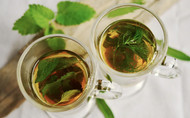Unlock the Secrets of Healing: 10 Great Herbal Teas for Ultimate Wellness
Posted by Ricardo R Matos on Apr 3rd 2025
10 Great Herbal Teas for Ultimate Wellness
In a fast-paced world saturated with synthetic solutions, nature offers a timeless remedy: herbal tea. Unlock the secrets of healing with a steaming cup that not only warms the soul but also nourishes the body. Herbal teas have been cherished for centuries, each blend a unique tapestry of flavors and health benefits. From soothing chamomile to invigorating ginger, these incredible brews hold the potential to enhance your wellness journey.
Imagine sipping on a delightful infusion that calms your mind, boosts your immunity, and revitalizes your spirit—all in one cup! Whether you're seeking relief from common ailments or striving for overall vitality, this guide presents ten great herbal teas that can elevate your daily routine. Discover the healing powers waiting to be steeped, and embrace a more balanced lifestyle, one sip at a time.
The Science Behind Herbal Teas and Wellness
Herbal teas are more than just comforting beverages; they are potent elixirs that harness the healing properties of plants. The science behind their benefits lies in the phytochemicals—natural compounds found in plants, such as flavonoids, alkaloids, and tannins. These compounds exhibit antioxidant, anti-inflammatory, and other health-promoting effects. Most herbal teas are caffeine-free, making them suitable for all ages and various health conditions.
The act of drinking herbal tea itself can be therapeutic, promoting relaxation and mindfulness. Each type of herbal tea offers unique health benefits, making them valuable additions to a holistic wellness regimen.
Top 10 Herbal Teas for Ultimate Health
- Chamomile Tea
- Peppermint Tea
- Ginger Tea
- Rooibos Tea
- Echinacea Tea
- Hibiscus Tea
- Lemon Balm Tea
- Lavender Tea
- Turmeric Tea
- Dandelion Tea
Chamomile Tea: Benefits for Sleep and Relaxation
Chamomile tea is renowned for its calming properties, making it an excellent choice for those seeking to improve sleep and reduce anxiety. Its gentle sedative effects stem from apigenin, which binds to receptors in the brain to promote relaxation. Studies have shown chamomile tea can significantly improve sleep quality, especially for those with insomnia. It also offers anti-inflammatory and antioxidant benefits, supporting overall wellness.
Peppermint Tea: A Soothing Remedy for Digestive Health
Peppermint tea, made from Mentha piperita leaves, is rich in menthol. It relaxes gastrointestinal muscles, easing bloating, gas, and indigestion. Its antimicrobial and anti-inflammatory properties further support gut health, making it a refreshing and effective digestive aid.
Ginger Tea: Natural Anti-Inflammatory and Immune Booster
Ginger tea, brewed from Zingiber officinale root, contains gingerol—a compound with potent antioxidant and anti-inflammatory effects. It helps reduce inflammation, supports immune function, and is especially helpful during cold and flu season. Ginger tea can also soothe sore throats and relieve congestion.
Rooibos Tea: Antioxidant Powerhouse for Skin Health
Rooibos tea, or red bush tea, is caffeine-free and rich in antioxidants like aspalathin and nothofagin. These protect skin from oxidative stress, reduce signs of aging, and help soothe irritation. Rooibos is also a source of alpha hydroxy acid (AHA), which promotes skin renewal and radiance.
Echinacea Tea: Strengthening Your Immune System
Echinacea tea, made from the Echinacea plant, is a potent immune booster. It stimulates white blood cell production, helping the body fight infections. Echinacea tea also has antiviral, antimicrobial, and anti-inflammatory properties, making it valuable during cold and flu season.
Other Herbal Teas for Wellness
- Hibiscus Tea: Supports heart health and lowers blood pressure.
- Lemon Balm Tea: Reduces anxiety and promotes calmness.
- Lavender Tea: Eases stress and improves sleep quality.
- Turmeric Tea: Anti-inflammatory and supports joint health.
- Dandelion Tea: Supports liver function and detoxification.
“Embracing herbal teas for a healthier lifestyle means reconnecting with nature's pharmacy and harnessing the healing power of plants. As you savor each cup, take a moment to appreciate the ancient wisdom and modern science that converge in this timeless remedy.”
How to Brew the Perfect Cup of Herbal Tea
- Choose high-quality, organic herbs or loose-leaf teas.
- Use boiling water (212°F/100°C) for most herbal teas; slightly cooler water (190°F/88°C) for delicate herbs like chamomile.
- Steep for 5–10 minutes, covering your cup to retain essential oils.
- Strain and enjoy hot or iced.
Conclusion: Embracing Herbal Teas for a Healthier Lifestyle
Incorporating herbal teas into your daily routine is a simple and enjoyable way to enhance your overall health and well-being. These natural infusions offer a wide range of benefits, from improving sleep and digestion to boosting the immune system and promoting skin health. Start today—brew a cup of chamomile to unwind, peppermint to soothe digestion, or ginger to boost immunity. Cheers to the healing power of herbal teas!

